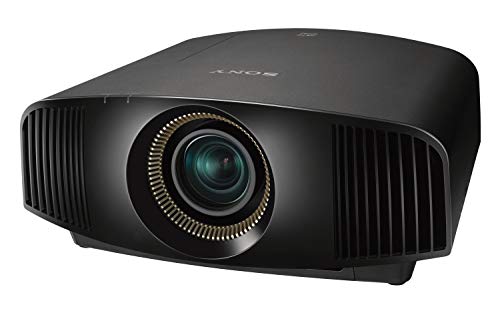Once upon a time, 4K resolution seemed like such an unreachable luxury for many. At the time, Full HD had just become the standard, and people were just starting to settle into their living rooms with their 3D televisions (remember those?!). Then, 4K resolution became a thing — and now, it’s becoming the standard.
These days, 4K resolution displays are becoming the norm, especially as consumer hardware, computers, gaming consoles, and media catch up. Thanks to technology getting cheaper, 4K can now be in more homes, offices, schools, and theaters. We truly are in the 4K era, where both standard and video editing laptops run 4K displays, mid-range monitors are in 2K or 4K, and 4K televisions are becoming much more affordable overall. All of this also leads to 4K projectors becoming more common too.
Whether you want a 4K display for gaming, your home theater, the office, or use at school, there are bound to be more affordable options — especially if you wait for a good sale. Although, don’t be surprised if you still find some premium options with a more substantial price tag.
A projector in 4K can be an excellent way to get a high-resolution display. Projectors have a small physical footprint and are incredibly portable, so you can create impromptu theaters or presentations as needed. But with so many projectors available today, and so many technical terms to keep track of, how do you know which one is the best projector with 4K resolution?
This article takes you through an in-depth buying guide to help you find the best 4K projector for your needs. We also included a list of our top recommendations to help you get started. So, let’s get right to it!
This Article Covers:
Best 4K Projector in 2022: Our Top Picks
|
Projector |
Description |
Key Features |
Link |
 |
Premium Ultra Short Throw Projector |
|
|

|
A 3LCD Pixel Shift 4K Projector with Great Color Reproduction |
|
|

|
Best Budget 4K Projector |
|
|
What to Consider When Choosing Your 4K Projector
If you’ve never had an HD projector or 4K projector before, how do you know how to pick the right one? As a first-time buyer, you may be overwhelmed with all the options on the market. And with all of the technical mumbo-jumbo around projectors, it can get confusing — and fast.
We put together this handy buying guide to help you get more familiar with the ins and outs of projectors. Feel free to keep it as a handy reference as you shop!
Consider the criteria below when buying a 4K HDR projector (or even just a normal 4K one).
Budget and Cost
Cost is, and always should be, your first consideration when shopping for a projector. That said, it’s worth mentioning that projector prices can vary wildly — they can be highly affordable or prohibitively expensive. You can easily find budget (non-4K) projectors at $100 or less and high-end units at over $2,000.
It’s worth mentioning that when shopping for projectors, the image quality should matter more than whatever brand the product is from.
Unlike televisions, monitors, and laptop displays, 4K projectors are still on the expensive end of the spectrum. You can expect to pay anywhere from >$500 to ~$5,000, so it’s best to plan your budget accordingly.
Projector Type
A little over thirty years ago, with the advent of DLP and LCD, projectors started becoming a bit more commonplace. Fast forward to today, and you’ll easily be able to find projectors at varying price points, making them even more viable for home use than ever before.
That said, you can buy five types of projectors today. Of course, you have DLP and LCD. Then there’s LED, LCoS, and laser. Here’s a quick primer on each one:
- DLP (Digital Light Processing) has a small monitor inside the unit. Images on this monitor are projected to a large screen using micro-mirrors.
- LCD (Liquid Crystal Display) displays images and videos by sending light from a lamp (typically metal-halide) through an internally-housed prism.
- LED references the light source used — Light Emitting Diodes. These projectors use LEDs in a mix of red, green, and blue to emit white light. The projector then filters the white light through a lens to project the image you see.
- LCoS (Liquid Crystal [Technology] on Silicon) is a DLP and LCD projector technology hybrid.
- Laser projectors use a combination of lasers and mirrors rotating at high frequencies to project an image.
Light Source
DLP, LCD, and now LED projectors are the most common and affordable types today.
DLP and LCD projectors typically use lamps that have life spans between 2,000 and 5,000 hours. This service life span will require you to replace the lamp every so often when it burns out. However, it’s possible to see these types of projectors use other light sources like a laser. A great example of this is the Samsung The Premiere DLP projector, which uses lasers as its light source.
Projectors using LEDs often have advertised life spans of up to 20,000 hours. LEDs generally have long life spans to begin with, which means you’ll need to do little to no maintenance. For this reason, some prefer a good 4K LED projector that requires next to no maintenance over years of ownership.
Laser projectors are often the most expensive but require far less maintenance (and no bulb replacements!) You’ll see laser projectors advertised to have up to 20,000-hour lifespans as well, though, with good care, they can certainly live longer — albeit with a reduction in brightness over time.
Light Output & Brightness
If you’ve ever seen projectors in rooms that aren’t pitch black, you’ll know that they need to be bright enough for you to see a clear image. Inadequately bright projectors put out muddy images that can severely lack sharpness.
The best way to know whether the projector is bright enough is to look at its ANSI Lumens rating.
In a room that isn’t fully dimmed, 1,200 to 1,500 ANSI Lumens will generally be enough for your office, home theater, or gaming needs. If you’ll be using your projector outdoors or in rooms with windows, you may want to consider upwards of 2,500 ANSI Lumens. Even 1,000 ANSI Lumens will be enough in pitch-black darkness and ideal conditions.
Resolution
Since we’re talking about a 4K home projector, you’ll want one that has 4K resolution. The dominant standard 4K resolution is 3840 × 2160, so you’ll want a projector with at least that. However, 4K projectors generally tend to have resolutions of 4096 x 2160 while displaying 8 million pixels.
Here’s where it gets confusing — some projectors are advertised as 4K but don’t actually have a 4K resolution. What gives?
Some projectors have what’s known as “native 4K,” where the projector can display 4K resolution at 8 million pixels.
Other projectors only have FHD (1080P) resolution but can display in 4K using pixel shifting. An FHD projector will project its image four times and then physically shift and overlap the pixels to artificially create an image with 9 million pixels.
Pixel-shift projectors are a lot cheaper than native 4K alternatives. This type of 4K projector is more than enough for most users, especially when true 4K options can cost thousands of dollars. The downside to pixel shifting is that its resulting image may not be as sharp, but this isn’t a problem for most.
Long Throw, Short Throw, and Ultra Short Throw
When you shop for a projector, you’ll see a few different types:
- Long (or regular) throw projectors are best installed further away from the screen and will not display a clear image if placed beyond the minimum advised distance. Long throw projectors typically sit at least 7~9 feet away from the screen to display a 100” image and are best for those with plenty of space.
- Short throw projectors are the opposite of long throw and can sit much closer to the screen. They can be as close as 3~ feet and still be clear. They are better suited for smaller spaces.
- Ultra short throw projectors can sit even closer — as close as a few inches to a couple of feet away from the screen. However, you’ll most likely need a special screen.
Contrast Ratio
You already know about the ANSI Lumens, but what is the contrast ratio? Contrast ratio refers to the ratio between an image’s black and white sections. A high contrast ratio results in blacker blacks and whiter whites.
You’ll want a high enough contrast ratio to prevent your image from looking washed out. 1500:1 looks excellent in a dark room, but in a non-treated room, you may want to start at 2000:1.
Contrast ratio is a whole world deserving of an entire guide on its own because manufacturers publish varying advertised contrast ratios. If you’d like to know more and avoid getting confused, this article by BenQ is a great read.
Color Reproduction
Just like when you shop for TVs or monitors, you may also want to consider color reproduction for a video projector with 4K resolution.
Color reproduction refers to how accurately the projector displays colors. You can find projectors that display colors with 100% accuracy, while some may lean warm or cool-toned.
Unless you need colors to be 100% accurate, it’s a matter of personal preference.
Build Quality and Portability
All projectors are portable machines you can take anywhere. Some even have built-in batteries and speakers to make your life much easier. However, some are smaller and lighter than others.
That said, it’s also essential to consider build quality. A poorly-built projector won’t last very long if you take it around with you. However, if you intend to park your projector in the living room and never move it again, this factor won’t matter as much.
Inputs
Most projectors these days will use modern inputs like HDMI. However, you may find some that still include DVI or VGA. Unfortunately, older connector types are no longer supported in most modern projectors. Ensure that your connectors are compatible with the projector before purchase (or buy the correct adapters if applicable).
It’s worth noting that some projectors also have features like screen mirroring. Others may have “smart” features that allow you to install apps onboard.
A Note on Screens
Although you can project your image onto a plain white wall, some people prefer to purchase special screens to optimize their projector’s display.
You can find screens in all sorts of sizes, fabrics, form factors, and prices. The type you need will depend on the room’s ambient light, viewing angle, and the distance between your projector and screen.
Best 4K Resolution Projector in 2022: Our Recommendations
1. Epson Home Cinema 4010 – Best Mid-Range LCD Projector


Specifications:
- Projector Type: 3LCD
- Size and Weight: 16.1” x 13” x 6.5”; 14.6 lbs
- Inputs: 2x HDMI, USB ports
- Native 4K: No
- Resolution: 4K pixel shift (2x 1080p)
- Light Output & Brightness: 2900 Lumens
- Contrast Ratio: Up to 40000:1 (dynamic)
- Estimated lifespan: 3,500 – 5,000 hours
It’s worth mentioning that although a lot of people know Epson from their printers, the Japanese company also makes plenty of other products — including many of the projectors that have been used in classrooms and offices to this day.
If you aren’t particular about having native 4K, the Epson Home Cinema 4010 is an excellent option that will allow you to experience 4K in 100% DCI-P3 color accuracy. This projector is sufficiently bright at 2400 Lumens, allowing you to see a clear image even with some ambient lighting. It can even take you from work to chill, as this projector is gaming-ready at 60Hz. That means you can get 60 frames per second (FPS) when you connect this projector to your gaming console or computer.
Those looking for a 4K budget projector should seriously consider the Epson Home Cinema 4010. Although you’ll need to replace the lamp every 3,500-5,000 viewing hours, this projector will get you through all of your business or entertainment needs.
Pros
- Color accurate (100% DCI-P3)
- Reasonably affordable
- Allows gaming at 60FPS
Cons
- Will eventually need lamp replacements
- Not native 4K
2. ViewSonic PX701-4K – Best Budget 4K Projector


Specifications:
- Projector Type: DLP
- Size and Weight: 12.28” x 8.74” x 4.25”; 6.17 lbs
- Inputs: HDMI, USB
- Native 4K: Yes, but also uses pixel shifting
- Resolution: 3840 x 2160 (4K UHD),
- Light Output & Brightness: Lamp; 3200 Lumens
- Contrast Ratio: 12000:1
- Estimated lifespan: 6,000 hours normal mode; up to 20,000 SuperEco mode
Projectors don’t have to be super expensive to be good, and the ViewSonic PX701-4K is perfect evidence of that fact. This projector is our choice for the best budget 4K projector out there today, and there are a few reasons behind that decision.
First of all, it’s hard to beat the price — of all the projectors on this list, the PX701-4K is the most affordable as you can buy it for less than a thousand bucks. And, at this price, you get many of the features available on other pricier models. For example, the ViewSonic PX701-4K is a true 4K projector, which is practically unheard of at its price range.
Of course, some compromises were made for its price. It’s not a short throw projector, so you’ll need plenty of space to make it work if you want a larger display screen (100” requires your projector to be 10.9 ft away from your wall, according to ViewSonic). You can get a much smaller screen at 3 feet away. Plus, it only has a 10W speaker, and there have been reports of this projector not being as bright or as saturated as some may like.
But if you’re willing to live with these compromises, you get a 6,000-20,000-hour life span (20k in SuperEco mode), 4.2ms ultra-fast input and 240Hz refresh rate for gaming (at 1080p), auto keystone, and more. ViewSonic also advertises this projector’s adjustability, which allows you to project on uneven or curved surfaces without an issue. Pretty neat feature, if you ask us.
Pros
- One of the best projectors you can buy at this price range
- Excellent for gaming
- Native 4K
- 3200 Lumens
- Up to 20,000 hours lamp life
Cons
- Speaker is an afterthought
- Bulky size
- No smart TV interface
3. XGIMI Horizon Pro – Best Native 4K Projector with Android OS


Specifications:
- Projector Type: DLP
- Size and Weight: 8.27” x 8.67” x 5.5”; 6.4 lbs
- Inputs: HDMI, USB, WiFi, RJ45 for ethernet connection
- Native 4K: Yes
- Resolution: 3840 x 2160
- Light Output & Brightness: LED; 2,200 ANSI Lumen
- Contrast Ratio: Unspecified
- Estimated lifespan: Up to 25,000 hours
The XGIMI Horizon Pro is a true 4K projector that’s seen a significant drop in price since its release in 2021. This projector looks modern and sleek and has the advantage of offering several types of input, output, and connectivity. It even has Android TV 10 built-in, so you can install whichever apps you need! What’s even better is this projector uses LED as its light source, so you can have up to 25,000 hours of use!
Pros
- Built-in Android TV 10.0
- Native 4K
- Various input and output options, including WiFi and Bluetooth
- Compact and modern design
- Easy setup
Cons
- Unspecified contrast ratio
- XGIMI software could be better
- Remote could be better
4. Samsung The Premiere Ultra Short Throw Projector LSP9T– Best High-End Ultra Short Throw 4K Laser Projector


Specifications:
- Projector Type: DLP with laser; choose between
- SP-LSP7TFAXZA – single laser version
- SP-LSP9TFAXZA – triple laser version
- Size and Weight: 14.4” x 21.7” x 5”; 25.35 lbs
- Inputs: HDMI, smart TV functionality, tap-to-mirror mobile mirroring
- Native 4K: No
- Resolution: Pixel shift 4K UHD (3840 x 2160)
- Light Output & Brightness: 2800 Lumens
- Contrast Ratio: 1500:1
- Estimated lifespan: 20,000+
Samsung’s The Premiere LSP9T is an ultra-short throw DLP projector using laser as a light source. The LSP9T model mentioned here uses three lasers to create the amazing image you’ll see on your wall. Speaking of which, although this is a UST projector, Samsung itself states that you won’t need any special screens — all you need is a white wall.
The only downsides to this projector are its astronomical price and the fact that it is not “true” native 4K. If you’d like a similar experience at around half the price, try the LSP7T (the single-laser version).
Pros
- Gorgeous images and 4K display even with pixel shifting
- Ultra short throw, does not require a screen
- Double 40W speakers
- Smart TV functionality
- Multiple voice assistants
Cons
- You would expect native 4K for the price
- Expensive!
5. Sony VPL-XW715ES – Best High-End Native 4K Projector


Specifications:
- Projector Type: LcOS
- Size and Weight: 18.1 x 7.9 x 18.6″; 28.7 lbs
- Inputs: HDMI, RJ45, USB
- Native 4K: Yes
- Resolution: 3840 x 2160 (native); up to 4096 x 2160
- Light Output & Brightness: Laser; 2,000 Lumens
- Contrast Ratio: Unspecified
- Estimated lifespan: 20,000 hours at medium brightness
The Sony VPL-VW715ES is not cheap. You’ll most likely face a bit of sticker shock when you see how much it costs (we’ll give you a hint — it’s pushing 5 figures). But Sony has packed this unit with features that make it worth the price.
You get native 4K LCoS and laser technology that can last up to 20,000 hours at medium brightness. This projector also uses the same video processing technology Sony has in its Bravia line of premium TVs.
Pros
- Incredible image quality
- Contrast is impressive
- Bravia picture processing
- Laser technology requires little maintenance
Cons
- Expensive!
- Manual lens controls could be better
- Not the best for gaming
6. XGIMI Aura – Best All-in-One Ultra Short Throw 4K Projector


Specifications:
- Projector Type: DLP
- Size and Weight: 5.51” x 24” x 15.75”; 38.84 lbs
- Inputs: Android 10, USB, RJ45, HDMI, WiFi
- Native 4K: No
- Resolution: 3840 x 2160 via XPR (expanded pixel resolution) technology
- Light Output & Brightness: Laser; 2,400 Lumens
- Contrast Ratio: Unspecified
- Estimated lifespan: Up to 25,000
If you’re looking for a TV projector in 4K, the XGIMI Aura is a great contender. It can go toe-to-toe with Samsung’s The Premiere (1-Laser) projector but is quite a bit more affordable.
The XGIMI Aura is a laser DLP projector that has plenty of connectivity options to give you flexibility and convenience. You can connect with WiFI, HDMI, and Android 10, so you don’t have to figure out a way to connect devices or streaming apps. It’s an ultra-short throw projector, which means you don’t need a ton of space to project a large image on your wall.
It’s not perfect, but if you want a laser projector without having to shell out the money for one of Samsung’s or Sony’s, the XGIMI Aura is one to consider. We only wish that it was a little smaller and lighter, but if it’s just going to sit on a TV stand or console table, then its size is not really a big deal!
Pros
- Laser light source lasts up to 25,000 hours of use
- Plenty of connectivity options, including Android 10, Bluetooth 5.0
- 4 x 15W speakers from Harman Kardon means great audio
Cons
- Bulky and heavy!
- Not native 4K
- Some rainbow effects occasionally noticed
7. BenQ X3000i – A Feature Rich Option


Specifications:
- Projector Type: DLP
- Size and Weight: 10.7” x 7.8” x 10.2” (without adjustment feet); 14.1 lbs
- Inputs: WiFi, Bluetooth, Android 10, Google Cast, HDMI, USB
- Native 4K: Yes
- Resolution: 3840 x 2160
- Light Output & Brightness: LED; 3,000 Lumens
- Contrast Ratio: 500,000:1
- Estimated lifespan: 20,000 hours; up to 30,000 with eco mode
The bulky BenQ X3000i is on the heavier side. But if you can get over its form factor, this projector actually has quite a lot to offer.
This DLP projector uses LEDs, which means no changing bulbs. You get up to 30,000 hours of use in eco mode and 20,000 in normal mode. It also offers incredible color reproduction, so you’ll see the vivid and saturated colors you expect.
The BenQ X3000i can project a clear 4K image from 30” to 300”, so you can live your home theater dreams once you’re done using this projector for work. You can also use it for gaming at 16ms, 60Hz in 4K, and 240Hz in 1080p.
Overall, we chose this model as one of our best 4K projectors thanks to its features and offerings. Just look at all the input and connectivity options!
Pros
- Amazing color reproduction
- Allows gaming with minimum lag
- Great audio
- Plenty of connectivity and input options
Cons
- Bulky
- Pricey
How We Selected the Best 4K Projectors
While you might usually come to us for tech tips, such as how to mirror an iPhone to a TV, we also offer in-depth guides and reviews. We researched the projectors on this list to ensure that our readers receive accurate and up-to-date information. We didn’t put a list of the top 4K projectors together randomly; we followed an intense process to determine which products to include.
In putting our recommendations together, we spent hours researching the best products available. Whether you’re looking for a budget 4K projector or a smart projector in 4K, we considered many factors before ultimately choosing our top picks.
Factors we considered include price, value for money, projector type, advertised lamp lifespan, portability, connectivity, build quality, features, and more. We excluded products that didn’t meet the mark, then began further narrowing down our list to arrive at the seven recommended above.
Beyond drawing from our own experiences with projectors, we also made sure to read plenty of reviews, join user forums, and ask people who own 4K projectors about their opinions on the products.
Frequently Asked Questions
Which Projector Is Best for 4K?
The best 4k projectors for home theaters are the Sony VPL-VW715ES. But, these can cost up to ten thousand dollars. Choosing the right projector for you (and your budget) is what you need to worry about the most. The guide in this article will help you find the perfect fit.
Is It Worth Getting a 4K Projector?
There are a few things to consider beforehand. For example, buying a 4K projector just because it’s 4K won’t always be the best idea — a great FHD projector trumps a mediocre 4K option. That said, if you have the money to spare and can take your time finding the best product for your needs, a projector in 4K can absolutely be worth it. The extra resolution can mean clearer images with tons more detail.
How Long Does a 4K Projector Last?
A 4K projector will last just as long as any other. The only determining factors are how you use it, how you care for it, and what type of projector it is. A properly cared for projector can live to the end of its advertised “lamp life.” For laser, LCD, and LED-type projectors, it can be up to 20,000 hours. For DLP projectors, it’s 2,000 – 5,000 hours between bulb replacements.
Conclusion
If you need a 4K display for your home office (or just your office), you’re in luck. 4K resolution displays are now much more accessible than they were before, thanks to the technology behind it getting cheaper overall. These days, there are tons of options when it comes to 4K TVs, monitors, laptops, and of course, projectors.
Selecting the best 4k projector for your needs is pretty simple, as long as you set a budget and then judge your options by a few important criteria. Remember to read a 4K projector review or two before you commit to any particular model!
One thing to note, however — although projectors are now much more affordable than they used to be, 4K projectors are still very much up there in price. Be prepared for a bit of sticker shock, and maybe wait for a sale!
We hope this buying guide helps you choose the perfect projector for your needs. If you think we missed one that should be on this list, let us know in the comments below.
Related:






